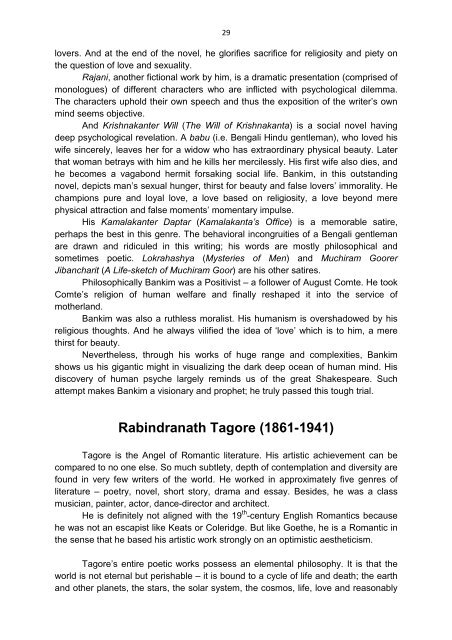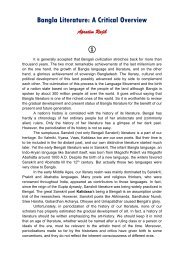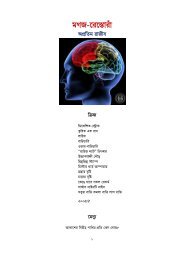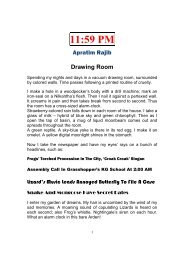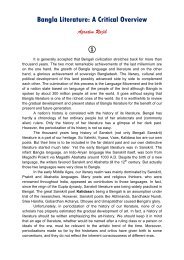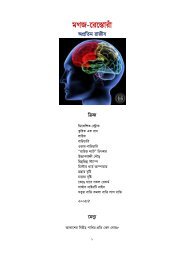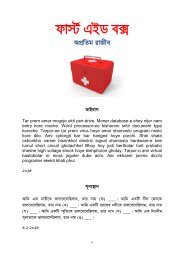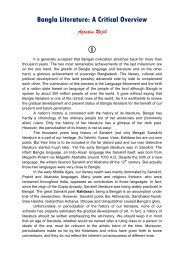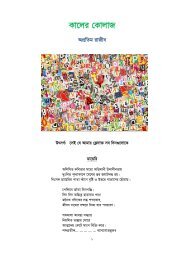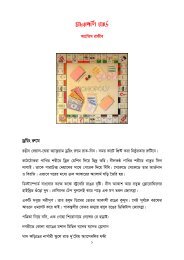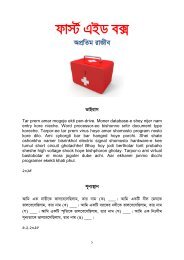BLiterature-Apratim
Create successful ePaper yourself
Turn your PDF publications into a flip-book with our unique Google optimized e-Paper software.
29<br />
lovers. And at the end of the novel, he glorifies sacrifice for religiosity and piety on<br />
the question of love and sexuality.<br />
Rajani, another fictional work by him, is a dramatic presentation (comprised of<br />
monologues) of different characters who are inflicted with psychological dilemma.<br />
The characters uphold their own speech and thus the exposition of the writer’s own<br />
mind seems objective.<br />
And Krishnakanter Will (The Will of Krishnakanta) is a social novel having<br />
deep psychological revelation. A babu (i.e. Bengali Hindu gentleman), who loved his<br />
wife sincerely, leaves her for a widow who has extraordinary physical beauty. Later<br />
that woman betrays with him and he kills her mercilessly. His first wife also dies, and<br />
he becomes a vagabond hermit forsaking social life. Bankim, in this outstanding<br />
novel, depicts man’s sexual hunger, thirst for beauty and false lovers’ immorality. He<br />
champions pure and loyal love, a love based on religiosity, a love beyond mere<br />
physical attraction and false moments’ momentary impulse.<br />
His Kamalakanter Daptar (Kamalakanta’s Office) is a memorable satire,<br />
perhaps the best in this genre. The behavioral incongruities of a Bengali gentleman<br />
are drawn and ridiculed in this writing; his words are mostly philosophical and<br />
sometimes poetic. Lokrahashya (Mysteries of Men) and Muchiram Goorer<br />
Jibancharit (A Life-sketch of Muchiram Goor) are his other satires.<br />
Philosophically Bankim was a Positivist – a follower of August Comte. He took<br />
Comte’s religion of human welfare and finally reshaped it into the service of<br />
motherland.<br />
Bankim was also a ruthless moralist. His humanism is overshadowed by his<br />
religious thoughts. And he always vilified the idea of ‘love’ which is to him, a mere<br />
thirst for beauty.<br />
Nevertheless, through his works of huge range and complexities, Bankim<br />
shows us his gigantic might in visualizing the dark deep ocean of human mind. His<br />
discovery of human psyche largely reminds us of the great Shakespeare. Such<br />
attempt makes Bankim a visionary and prophet; he truly passed this tough trial.<br />
Rabindranath Tagore (1861-1941)<br />
Tagore is the Angel of Romantic literature. His artistic achievement can be<br />
compared to no one else. So much subtlety, depth of contemplation and diversity are<br />
found in very few writers of the world. He worked in approximately five genres of<br />
literature – poetry, novel, short story, drama and essay. Besides, he was a class<br />
musician, painter, actor, dance-director and architect.<br />
He is definitely not aligned with the 19 th -century English Romantics because<br />
he was not an escapist like Keats or Coleridge. But like Goethe, he is a Romantic in<br />
the sense that he based his artistic work strongly on an optimistic aestheticism.<br />
Tagore’s entire poetic works possess an elemental philosophy. It is that the<br />
world is not eternal but perishable – it is bound to a cycle of life and death; the earth<br />
and other planets, the stars, the solar system, the cosmos, life, love and reasonably


